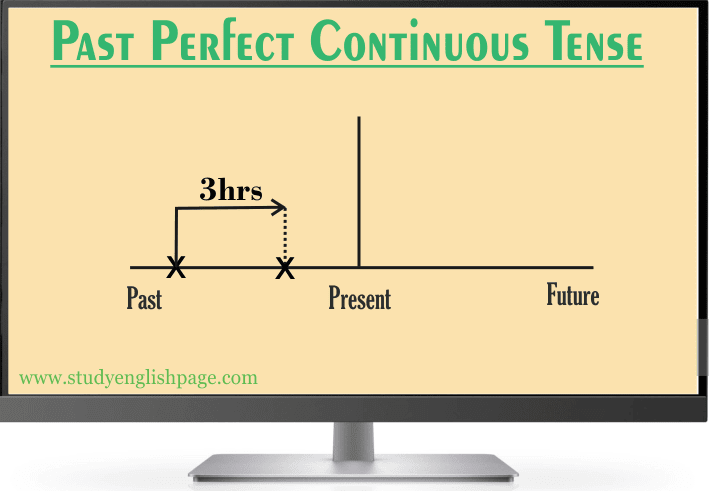Past Perfect Progressive Tense
Past perfect progressive tense shows an action that was started in the past and continued up to another action in the past. This tense emphasizes the duration or amount of time of action which was in progress before another action in the past.
As: He had been studying English for three hours when his
father got home.

- They had been talking for over an hour before Ali arrived.
- She’d been working at that company for three years when it went out of business.
- Ali requested to sit down because he had been standing all day at work.
- Ali had been teaching at the university for ten years before he left for Asia.
Past Perfect Continuous Forms
The past perfect continuous is formed by using had +
been + present participle form of the verb. In questions, we use ‘had’ at the
beginning of the sentence. Negatives are made with not.
Affirmative:
Subject + had + been + verb (present participle) . . . . . .
- They had been discussing for an hour before we came.
- It had been raining for three hours by the time we reached Murree.
- She’d been working at that company for three years when I got a job there.
- They had been waiting for us at my uncle's house for two hours when we came.
Negative:
Subject + had + not + been + verb (present participle) . . . .
. .
- They had not been discussing for an hour before we came.
- It had not been raining for three hours by the time we reached Murree.
- She’d not been working at that company for three years when I got a job there.
- They had not been waiting for us at my uncle's house for two hours when we came.
Interrogative:
Had + subject + been + verb (present participle) . . . . . .
- Had they been discussing for an hour before we came?
- Had it been raining for three hours by the time we reached Murree?
- Had she been working at that company for three years when I got a job there?
- Had they been waiting for us at my uncle's house for two hours when we came?
Negative and Interrogative:
Had + not + subject + been + verb (present participle) . . . .
. . (Am Eng)
- Had not they been discussing for an hour before we came?
- Had not it been raining for three hours by the time we reached Murree?
- Had not she been working at that company for three years when I got a job there?
- Had not they been waiting for us at my uncle's house for two hours when we came?
Had + subject + not + been + verb (present participle) . . . .
. . (Br Eng)
- Had they not been discussing for an hour before we came?
- Had it not been raining for three hours by the time we reached Murree?
- Had she not been working at that company for three years when I got a job there?
- Had they not been waiting for us at my uncle's house for two hours when we came?
Yes/No Questions and short Answers
A question that is answered by Yes or No is called a Yes/No
Question.
A short answer means to use just subject and auxiliary after yes
or no to give an answer. A comma is used after Yes or No.
Ex:
- Had you been discussing for more than five minutes when we came?
Yes, I had.
- Had it been raining since morning by the time you talked about the cancellation of the picnic?
No, it had not.
Information Questions (wh questions) and Answers
A question that is asked to interrogate or get information is
called an information question.
Ex:
- What had she been studying for up to four years when she moved to Germany?
She had been studying computer programming for up to four
years when she moved to Germany.
- Where had they been eating for twenty minutes by the time their father got home?
They had been eating for twenty minutes in the kitchen by the
time their father got home.
- Why had she been waiting for her husband for two hours before she went to bed?
Because she had to serve him food before she went to bed.
- Who had been eating for ten minutes by the time we started to eat?
Tom had been eating for ten minutes by the time we started to
eat.
- Whose clothes had she been washing for an hour when you got there?
She had been washing her clothes for an hour when I got
there.
- Which book had you been studying for many days before the one I suggested?
I had been studying English Grammar Book for many days before
the one you suggested.
- How had it been raining since morning when we came?
It had been raining cats and dogs since morning when you came.
